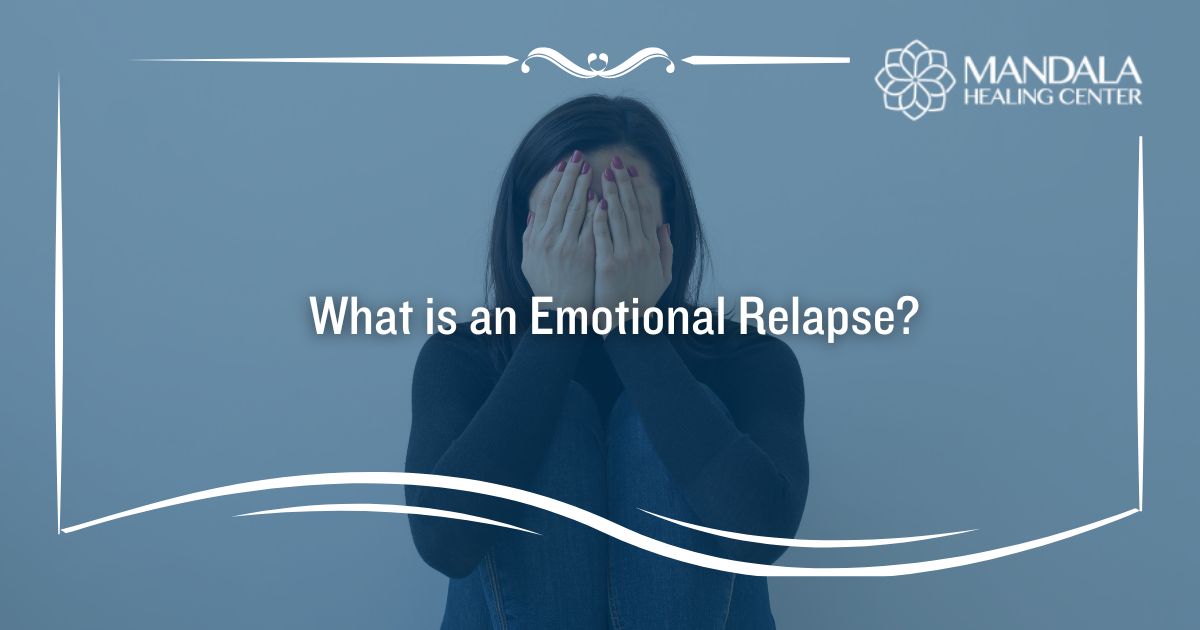Addiction is a chronic and progressive disease that must be maintained daily to prevent a relapse. According to the National Institute on Drug Abuse (NIDA), the relapse rate for substance abuse is between 40 to 60%.[1] Thankfully, drug rehab programs help you develop strategies like relapse prevention plans to avoid experiencing one.
Most people think of relapse as a single experience. You probably imagine relapses by thinking about the act of returning to drug or alcohol abuse. However, relapses actually occur in three stages.
The first stage of relapse is called an emotional relapse. This occurs before you even think about picking up a drug or alcohol. Emotional relapses are characterized by poor self-care and negative emotions running your life.
Knowing what an emotional relapse is, the signs of it, and how to overcome it can prevent you from progressing to the physical stage of relapse.
In this article, you will learn:
- What are the stages of relapse
- What are the symptoms of an emotional relapse
- How to overcome an emotional relapse
What are the Stages of Relapse?
Relapse occurs in three stages, and in each stage, there are red flags and common warning signs that you can identify.
The three stages of relapse include:
Emotional Relapse
This stage is characterized by poor self-care. You might be avoiding your emotions instead of working through them. It is also common to experience increased symptoms of mental health that are making it difficult for you to thrive.
You might be attending recovery support groups less often, isolating from your friends, and experiencing mood swings.
Mental Relapse
Mental relapse occurs if you do not course-correct after an emotional relapse begins. To explain, mental relapses are defined as experiencing a war in your mind. While you might not want to abuse substances, you are starting to think about drugs more frequently.
This relapse stage is often associated with romanticizing past drug abuse, coming up with excuses for drinking or using drugs, or feeling like the recovery process is not working for you.
Physical Relapse
Physical relapse occurs after a mental relapse is not addressed. This stage of relapse is when you actually engage in drug or alcohol abuse. The negative emotions you experienced triggered a relapse, causing you to return to the substance abuse you worked hard to overcome.
What are the Signs of Emotional Relapse?
Emotional relapses can potentially trigger a physical relapse. However, being aware of the signs will help you identify this stage before it’s too late. You can double down on your recovery maintenance techniques and overcome an emotional relapse before it progresses.
The signs of an emotional relapse include:
- Experiencing overwhelming feelings of depression and a loss of motivation
- Intense fear, worry, or large amounts of stress
- Having a hard time controlling your emotions and experiencing mood swings
- Experiencing outbursts of anger
- Not using coping skills to deal with your emotions and allowing them to fester
- Attending recovery meetings or therapy less frequently than you should be
- Allowing negative emotions to become the center of your life instead of working through them
This stage of relapse is all about uncomfortable emotions beginning to take over your life. Instead of doing the things you learned to cope with negative thoughts and feelings, you allow them to impact your daily life. If you are experiencing this stage of relapse, you should be using relapse prevention strategies to prevent it from progressing.
How to Overcome Emotional Relapse
If you notice that you are experiencing an emotional relapse, there are tons of things you can do to prevent yourself from abusing drugs and alcohol. When you experience negative emotions, you should work through them instead of allowing them to build up under the surface. Working through your problems will prevent your relapse from becoming mental or physical.
Recovering addicts experiencing an emotional relapse should:
- Reach out for help – When you are having a hard time emotionally, you should reach out to your friends, family, or recovery community for support. Having someone there for you can lessen the negative emotions you are experiencing and put you back on the right track.
- Attend therapy – Because this stage of relapse is all psychological, attending therapy can resolve it. Therapists will teach you how to deal with uncomfortable emotions effectively, preventing them from running your life.
- Increase attendance of support groups – Addiction support groups like 12-step meetings are great tools for overcoming an emotional relapse. You will hear other’s stories, gain advice from people in sobriety, and learn new coping mechanisms to use.
- Try new coping mechanisms – If your coping mechanisms are no longer helping you deal with your emotions, it might be time to try new ones. You can ask friends, a therapist, or someone in your recovery community what they do to cope with explosive feelings.
- Acknowledge your feelings – Lastly, you must acknowledge your feelings. Avoiding them will only allow them to worsen under the surface. Consider journaling and keeping track of when these emotions crop up, which makes it easier to see the pattern that is creating your problems.
Find Help for Drug Addiction and Alcoholism
If you or a loved one suffers from a substance use disorder, it’s time to seek help. Long-term recovery requires professional treatment from a drug rehab program. Thankfully, Mandala Healing Center is here to offer you the support you need.
Contact us today for more information on our drug and alcohol rehab program.
References:
- The National Institute on Drug Abuse (NIDA): The Science of Addiction Treatment and Recovery












